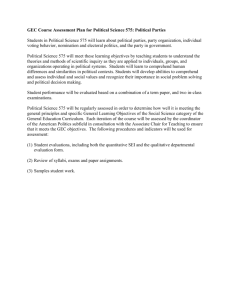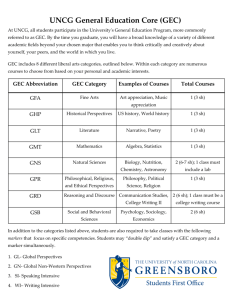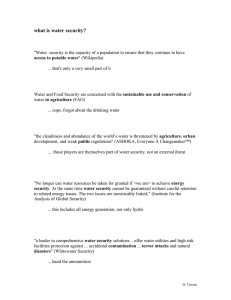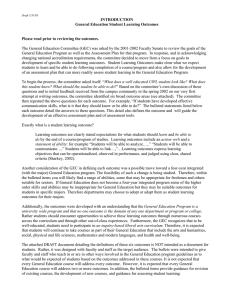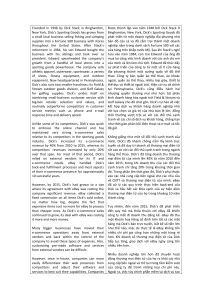4-18-00
advertisement
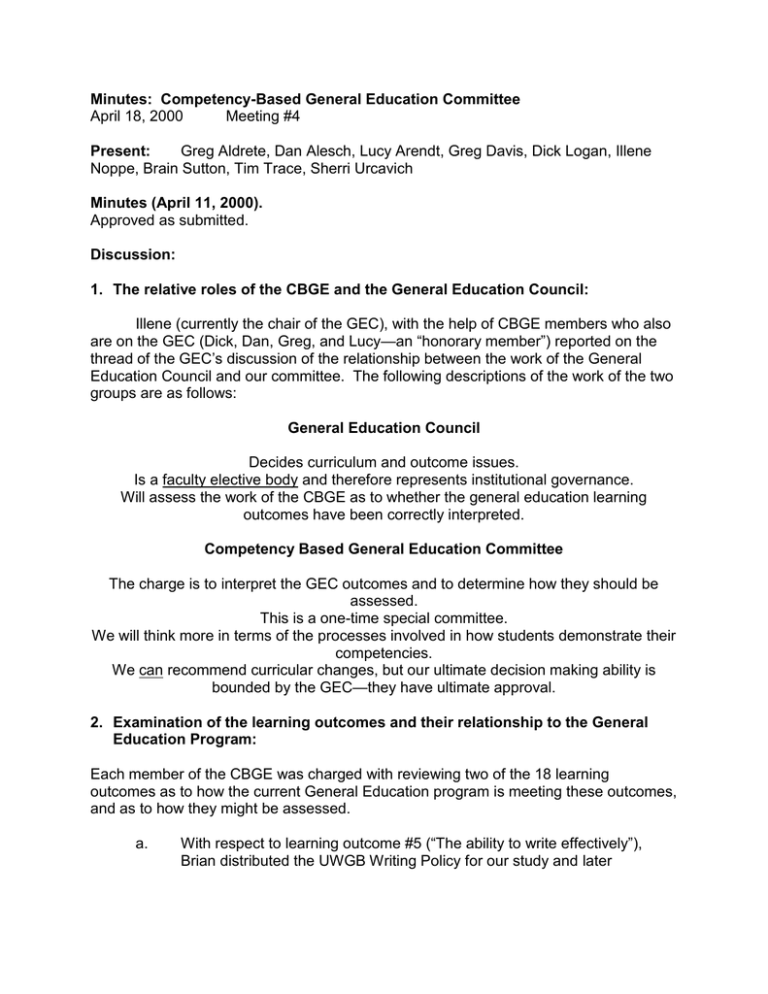
Minutes: Competency-Based General Education Committee April 18, 2000 Meeting #4 Present: Greg Aldrete, Dan Alesch, Lucy Arendt, Greg Davis, Dick Logan, Illene Noppe, Brain Sutton, Tim Trace, Sherri Urcavich Minutes (April 11, 2000). Approved as submitted. Discussion: 1. The relative roles of the CBGE and the General Education Council: Illene (currently the chair of the GEC), with the help of CBGE members who also are on the GEC (Dick, Dan, Greg, and Lucy—an “honorary member”) reported on the thread of the GEC’s discussion of the relationship between the work of the General Education Council and our committee. The following descriptions of the work of the two groups are as follows: General Education Council Decides curriculum and outcome issues. Is a faculty elective body and therefore represents institutional governance. Will assess the work of the CBGE as to whether the general education learning outcomes have been correctly interpreted. Competency Based General Education Committee The charge is to interpret the GEC outcomes and to determine how they should be assessed. This is a one-time special committee. We will think more in terms of the processes involved in how students demonstrate their competencies. We can recommend curricular changes, but our ultimate decision making ability is bounded by the GEC—they have ultimate approval. 2. Examination of the learning outcomes and their relationship to the General Education Program: Each member of the CBGE was charged with reviewing two of the 18 learning outcomes as to how the current General Education program is meeting these outcomes, and as to how they might be assessed. a. With respect to learning outcome #5 (“The ability to write effectively”), Brian distributed the UWGB Writing Policy for our study and later discussion. This policy offers many criteria that we might want to underscore in our consideration of the assessment of effective writing. b. With respect to learning outcome #9 (“A fundamental understanding of the Natural Science, including major concepts, principles, and theories of the biological and physical environment”), Greg Davis examined the list of courses that are offered in Natural Sciences that are currently a part of our General Education curriculum. He came to the conclusion that our curriculum does not give the student many choices for general education in terms of fundamental principles, concepts and theories that are common to all the sciences. In addition, in many cases this may be dependent upon the faculty who teach these courses. Greg considered the notion that there is nothing in our curriculum that provides an overall introduction to the sciences. c. Sherry also considered learning outcome #9 and used a different strategy. She asked faculty who taught General Education Natural Sciences courses what they felt they had accomplished in terms of the competencies. The list that was generated will be duplicated and distributed to the CBGE meeting of next week. d. Deb Pearson also considered learning outcomes #9 and #10 and submitted a detailed analysis to Lucy. These will be duplicated and distributed next week. e. With respect to learning outcome #11 (“A fundamental understanding of the Social Sciences, including major concepts of social, political, geographic and economic structures”), Dick began with the basic question, “What should every prospective citizen be literate in?” Dick suggested that we should convene a meeting of department chairs in order to get an overview of the social sciences. f. With respect to learning outcome #12 (“A fundamental understanding of the Social Sciences, including the impact that social institutions and values have on individuals and groups in a culture”), Illene suggested that in order to effectively assess this outcome we need to break this down into three separate parts, and then general a list of specific understandings (e.g., understand how the scientific method is and is not effectively used in the study of social phenomena) that can be adequately assessed. g. Dan suggested that assessment should involve both quantitative and qualitative analyses. Recommendations As a result of our preliminary perusal of the learning outcomes, the CBGE came to the conclusion that considerable attention must be paid the current General Education curriculum with an eye towards revisions that would created with the learning outcomes already in mind. The following suggestions were offered: a. We need overview courses to the domains that address how they represent different ways of knowing and understanding. b. Part of a university education is to expose students to a broad based liberal education. c. The new freshman seminar course may be a good vehicle to begin the process of instructing our students on the major learning paradigms. This course would be a good way to address the first eight competencies. d. General Education has to be the foundation of a liberal arts education. New “domain” courses can provide such a foundation providing they address the following: Students can complete their degrees in 120 credits. Enough sections of “domain courses” are offered. Times should not conflict. Students (and faculty) need to be instructed as to the rationale behind such general education foundation courses. The level of rigor has to be maintained. Students may be able to master the competencies without taking these courses, but the alternatives need to be limited. For next week (April 25, 9:45 – 10:45, ES301 Conference Room): The CBGE will consider learning outcomes 1 – 8 and 13 – 18. The General Education Task Force report of 1991-1992 was distributed and will be discussed. Lucy will invite Dave Galaty as an honored guest to discuss the Introduction to Humanities course as well as the 1991-92 task force report. Also distributed were the 1996-1997 Task Force report on Upper Level General Education courses, and documents on Credit for Prior Learning. Respectfully submitted, Illene C. Noppe Co-chair, Competency Based General Education Committee Approved 4/25/00
